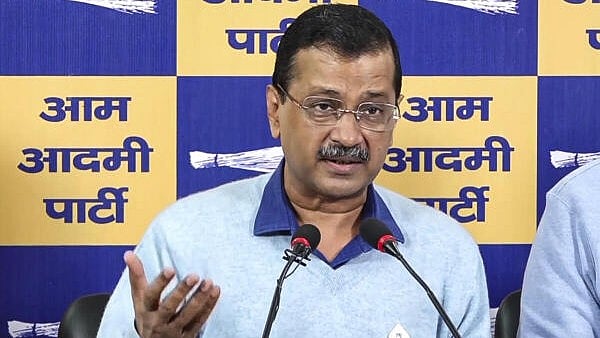
AAP National Convenor Arvind Kejriwal
PTI
The decision by the Aam Aadmi Party (AAP) to contest the 2025 Delhi Assembly elections without an alliance with the Congress has set the stage for a high-stakes battle that could alter the political dynamics of the city-state.
This choice, deeply rooted in AAP’s confidence in its governance record and grassroots outreach, could come with significant risks, especially concerning its equations with the Muslim vote. Historically, the Muslim community has played a pivotal role in determining electoral outcomes in Delhi, and its vote could once again be the key to who wins the upcoming assembly election.
However, this time, AAP’s strategy of going it alone could see its influence in this critical demographic wane, as it faces the challenge of addressing a growing sense of alienation among Muslim voters — an issue that Congress has been quick to capitalise on.
The community, which makes up approximately 15-18 per cent of the population, has shifted its support between the Congress and AAP in recent years. This shifting allegiance has created opportunities and challenges for both parties.
In the past, the Congress was the dominant political force among Muslim voters, particularly until the 2013 Delhi assembly elections. Then, despite AAP’s rise and its disruption of the status quo, the Congress still secured a significant portion of the Muslim vote, winning four of the eight seats it claimed from Muslim-majority constituencies. This showed the significant sway the Congress held over the community, despite AAP’s attempts to create a new political order.
However, in the 2015 Assembly polls, AAP experienced a significant breakthrough. For the first time, the Muslim vote decisively swung in favour of Arvind Kejriwal’s party, with an estimated 77 per cent of Muslim voters supporting AAP. This overwhelming backing was a testament to AAP’s secular appeal and its focus on governance. AAP won nine out of 10 constituencies with a significant Muslim population, including Okhla, a stronghold of the community. The margin of victory in these constituencies was staggering — Amanatullah Khan’s win in Okhla, for example, was by over 65,000 votes. This marked a high point in AAP’s relationship with Delhi’s Muslim voters, positioning it as the party that could bridge communal divides and focus on governance rather than identity politics.
This overwhelming support stemmed from AAP’s secular positioning and grassroots focus, which resonated deeply with the community. However, by 2020, the political narrative began to evolve. Despite AAP’s subtle shift toward Hindutva posturing following its 2019 Lok Sabha election defeat, 69 per cent of Muslims still backed the party in the 2020 Assembly polls, while the Congress managed only 15 per cent.
The 2022 Municipal Corporation of Delhi (MCD) elections, however, exposed significant cracks in AAP’s hold over Muslim-majority constituencies. Areas like Seelampur, Shaheen Bagh, and Mustafabad, which had been key supporters of AAP in the past, saw a marked shift in allegiance towards the Congress. This shift occurred in the backdrop of the communal riots of 2020 and the controversial Citizenship Amendment Act (CAA). AAP, seen by many as complicit in the inability to prevent or address the violence, failed to resonate with the Muslim community in these riot-hit areas. The Congress, on the other hand, capitalised on its vocal opposition to the CAA and its continued engagement with the anti-CAA protests, positioning itself as the party that would defend the rights of Muslims in Delhi.
In the MCD elections, despite holding key constituencies like Okhla, AAP lost ground in many areas where it had previously been dominant. The Congress’ engagement with Muslim issues helped it secure victories in several key wards, including areas like Abul Fazal Enclave, Mustafabad, Brijpuri, and Shastri Park.
These results signalled that while AAP’s brand of governance may have worked for many, its inability to address the specific concerns of the Muslim community, particularly in light of the 2020 riots, had led to a decline in its Muslim vote share. The Congress was able to tap into this discontent, positioning itself as a viable alternative.
For AAP, the implications of these developments are far-reaching. While it may still retain a significant portion of the Muslim vote, the fragmentation of this support between the Congress and AAP could prove costly. In the absence of an alliance, this fragmentation could very well benefit the Bharatiya Janata Party (BJP), which has consistently exploited divisions within the Opposition.
The BJP has long recognised the importance of communal polarisation, and a divided secular vote could make it easier for the party to maintain its dominance in Delhi. AAP’s challenge will be to bridge this divide, while also addressing the growing perception that it is distancing itself from the concerns of minority communities.
At the heart of this issue is AAP’s evolving political identity. The party’s early appeal among the minorities was its secular credentials, its emphasis on governance, and its ability to position itself as a non-corrupt, clean alternative to the entrenched political parties. However, its occasional alignment with majoritarian sentiments has complicated its relationship with Muslim voters. This shift in political positioning may have been intended to counter BJP’s narrative, but it has inadvertently undermined AAP’s earlier promises of inclusivity and secularism.
Looking ahead, AAP must find a way to address the concerns of the Muslim community while retaining its broader secular appeal. The Congress, on the other hand, has seen a steady resurgence in Muslim-majority areas, and it could prove to be a significant challenger in these constituencies. The absence of a Congress-AAP alliance only heightens the risk of a fractured secular vote, which will play into the hands of the BJP.
(Sayantan Ghosh is a research scholar and teaches journalism at St. Xavier’s College (autonomous), Kolkata. X: @sayantan_gh.)
Disclaimer: The views expressed above are the author's own. They do not necessarily reflect the views of DH.